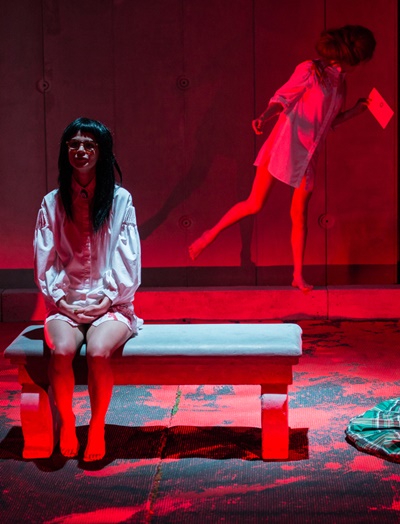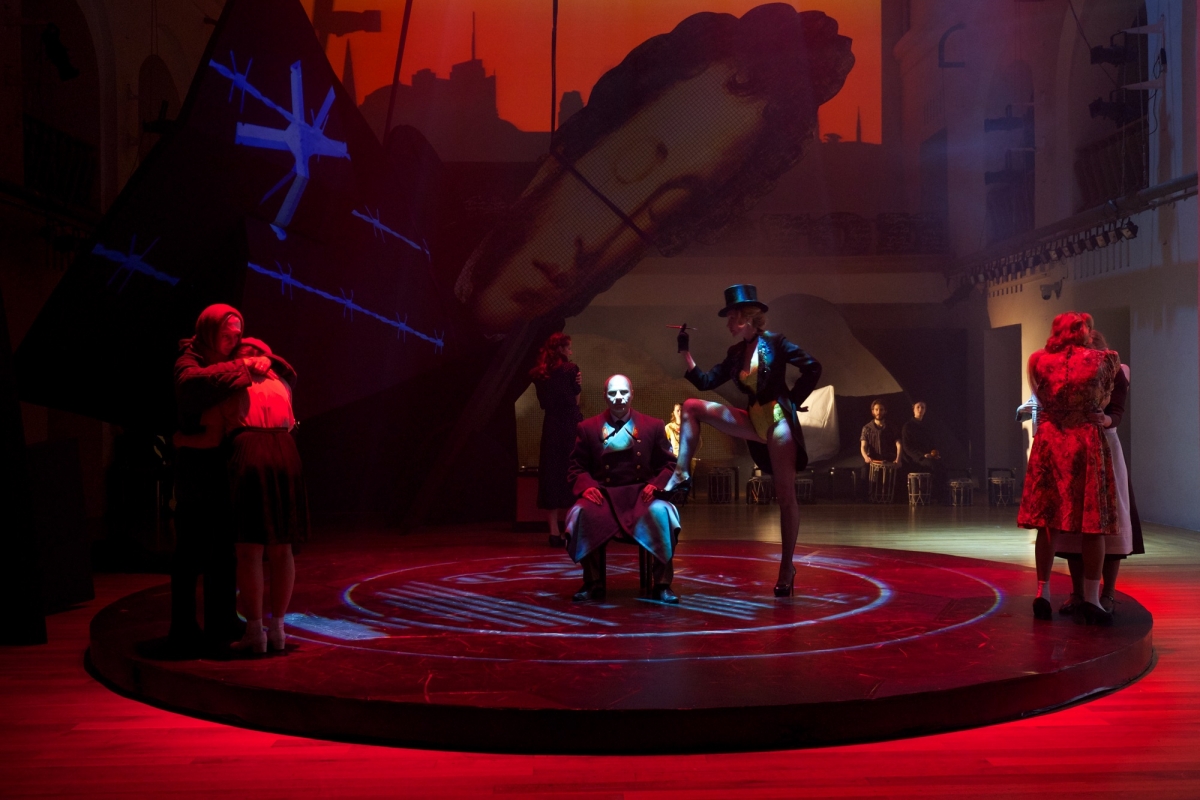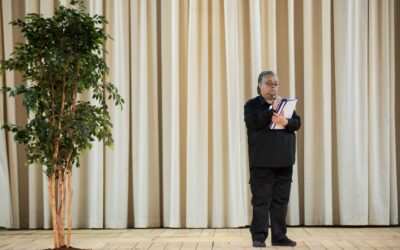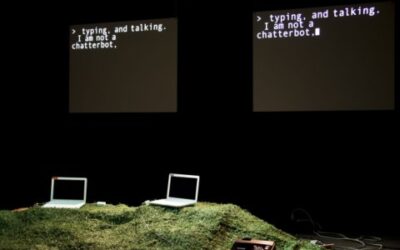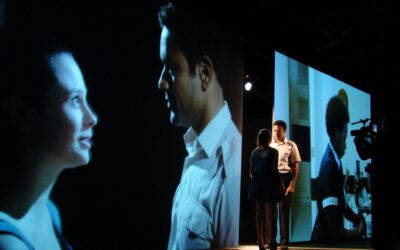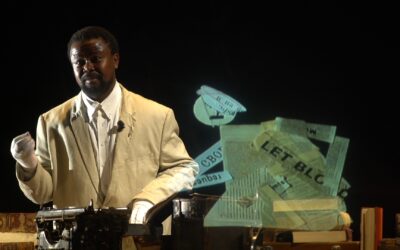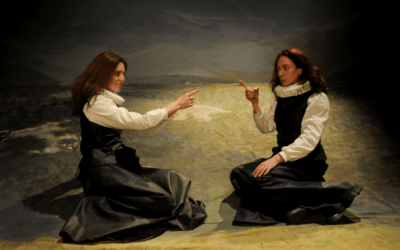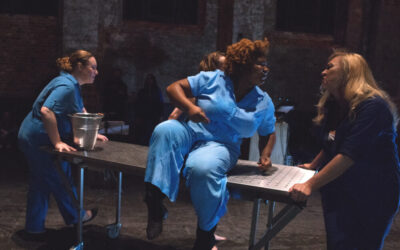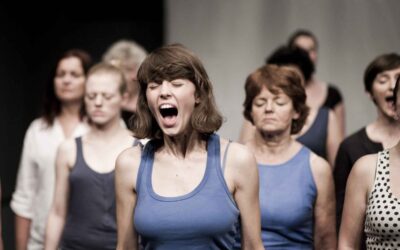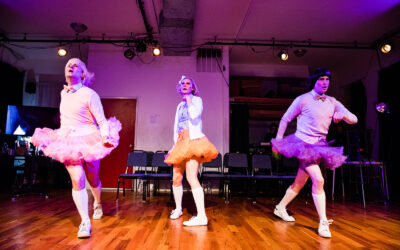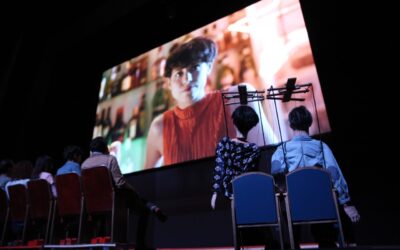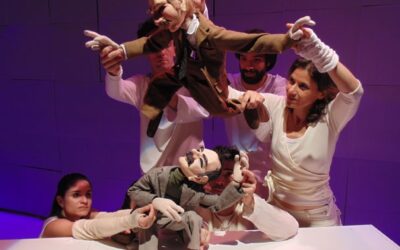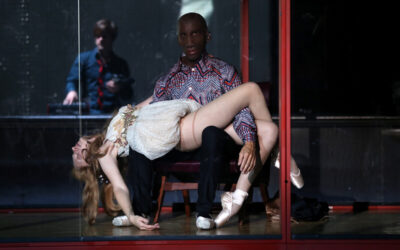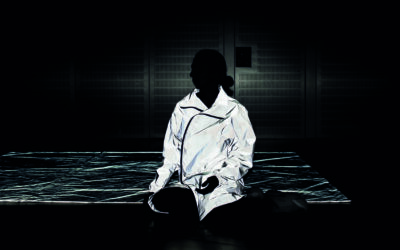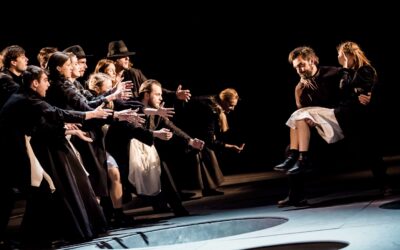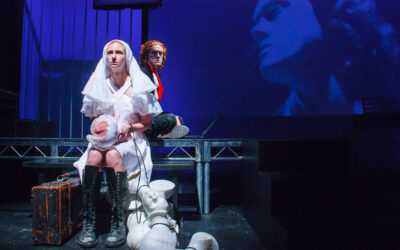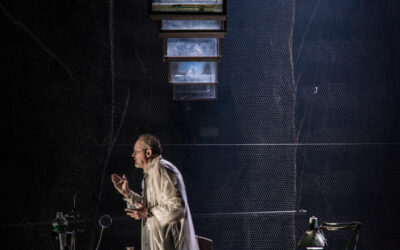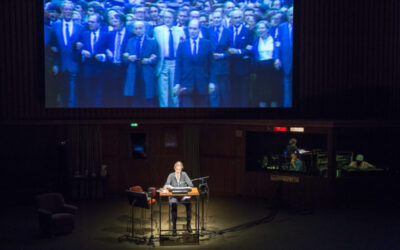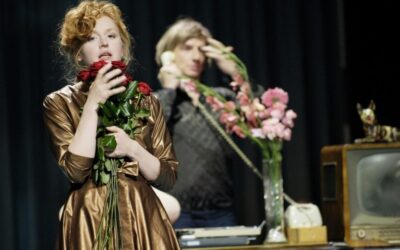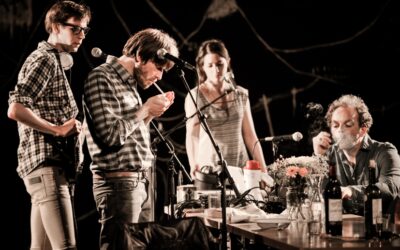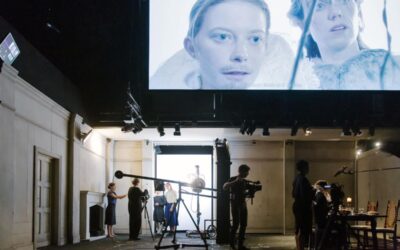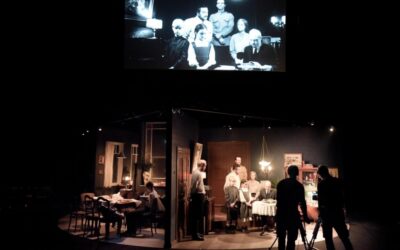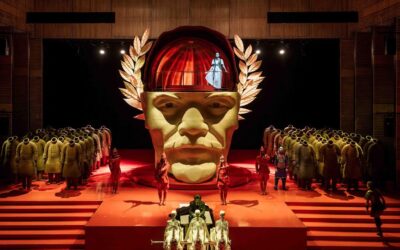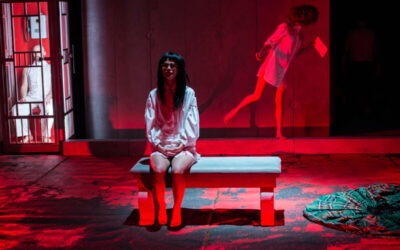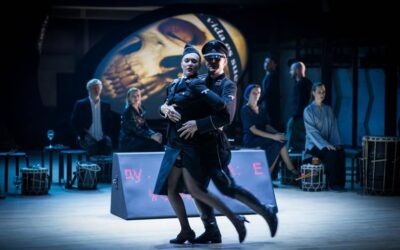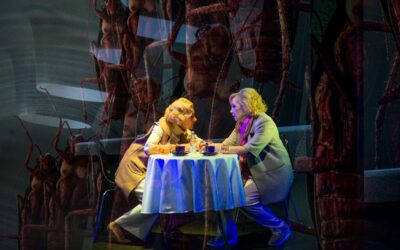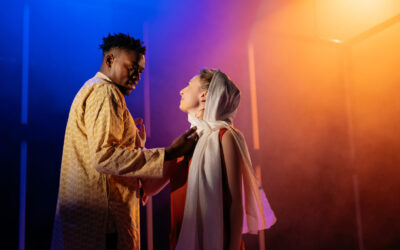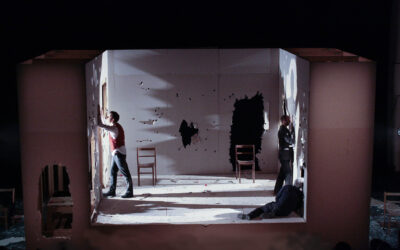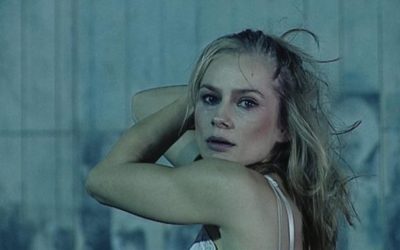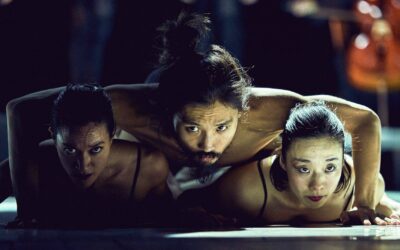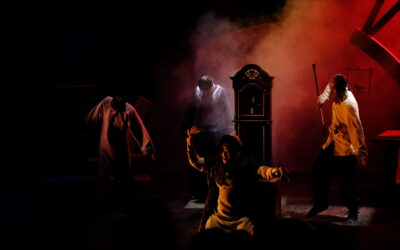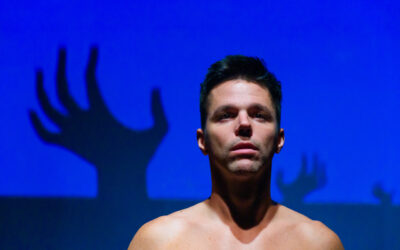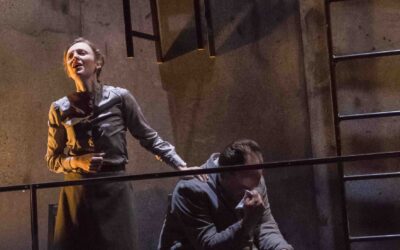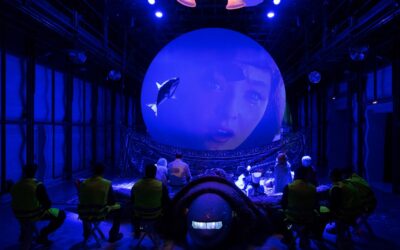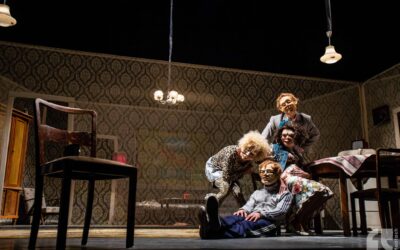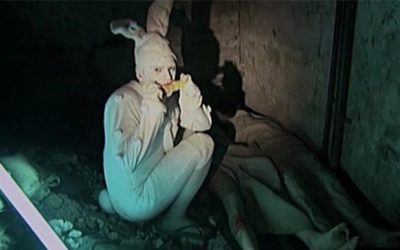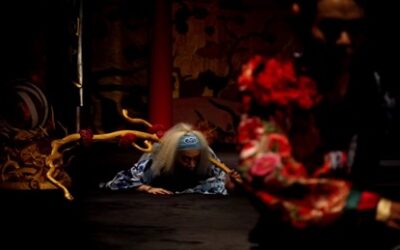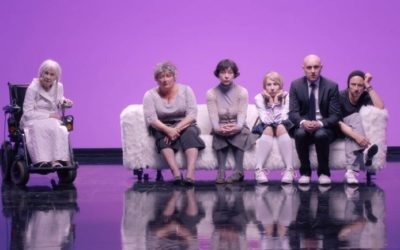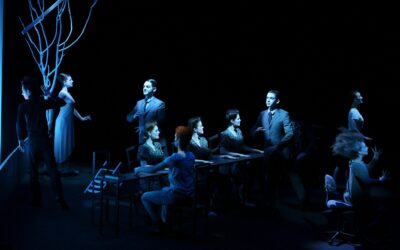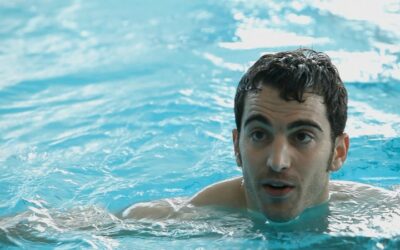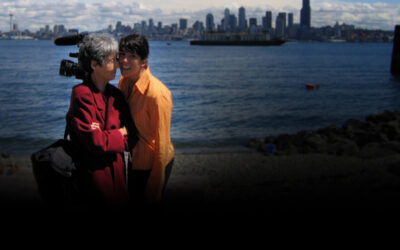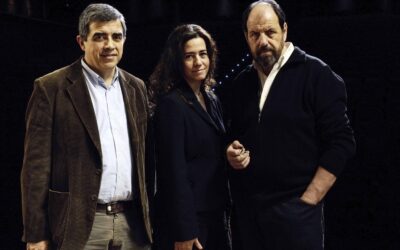The IOTF: The International Online Theatre Festival took place from 15 April to 31 May.
Wherever you were, you were able to see a range of work from global artists and companies, as well as renowned filmmakers who have turned to theatre as a mode through which to explore process, craftsmanship, and performativity.
This year’s festival featured 25 productions from leading international companies including Reckless Sleepers, TR Warszawa, Stanislavsky Electrotheatre, and the Schaubühne.
15 April, 2020 – 15 May, 2020
IOTF WAS EXTENDED UNTIL MAY 31!
CLICK HERE FOR PRESS RELEASE!

‘in a world where you can be anything’
Our 2020 theme ‘in a world where you can be anything…’ aimed to create an online space that blurs geographical boundaries, rejects simplifications about borders and national identities, and brings us together as a community to think about what it means to be human.
BEYOND THE STAGE
This year’s festival introduced a new section ‘Beyond the Stage’ which screened three films (Masks, Virus of Fear, The Rest I Make Up), markedly different in style and tone, but all fundamentally questioning the role theatre can play in our everyday lives. Ultimately, these films question what it means to create – whether this creation refers to a play, a character, or a myth. Here, we turned again to the central question of our festival: ‘In a world where you could be anything…’ What then, would you be?
The IOTF is a celebration of innovative global theatre artists working in diverse mediums and styles. Previous editions have included the work of acclaimed companies and theatres such as Complicité, Frantic Assembly, and the Grand Teatre del Liceu, as well as new, emerging artists just launching their careers. TheTheatreTimes.com collaborated again with Ninateka and Digital Theatre+, who provided two productions for the festival’s closing week. Our 2020 programme featured Berlin’s Schaubühne and Moscow’s Stanislavsky Electrotheatre, each with five productions screening on different dates.

TheTheatreTimes.com is an open-access global theatre portal. Since its launch in November 2016, TheTheatreTimes.com has published over 3,800 articles and theatre reviews covering theatre in 90 countries and regions. With 30 thematic sections, more than 150 Regional Managing Editors, over 60 media partners around the world, and 60,000+ followers on social media, we have grown to be the most far-reaching and comprehensive global theatre portal today, attracting over 300,000 visitors per month.
IOTF ARTISTIC TEAM
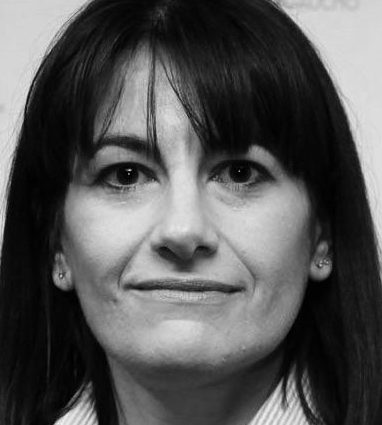
Maria Delgado
Executive Director of IOTF Professor at The Royal Central School of Speech and Drama, University of London
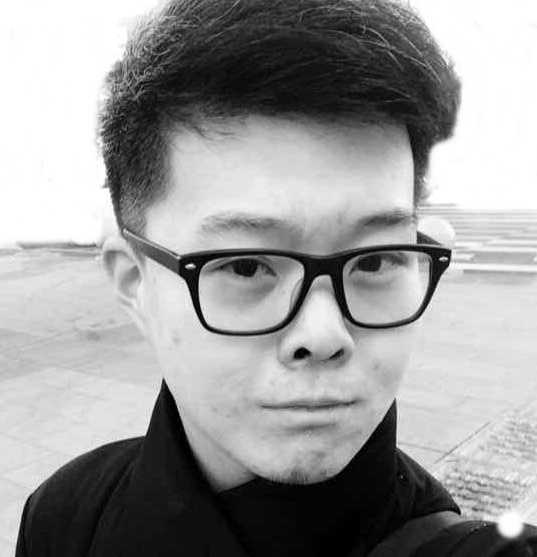
Xunnan Li
Artistic Director of IOTF Doctoral candidate at Royal Holloway University of London
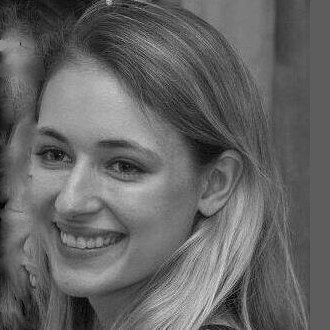
Alma Prelec
Artistic Director of IOTF Doctoral candidate at The Royal Central School of Speech and Drama, University of London
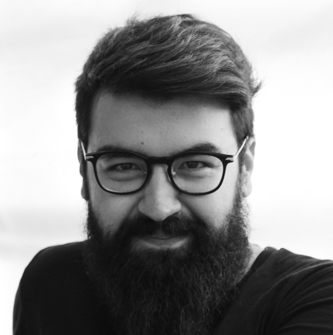
Gabriel Vivas-Martínez
Artistic Director of IOTF Doctoral candidate at The Royal Central School of Speech and Drama, University of London

Magda Romanska
Executive Director and Editor-in-Chief of TheTheatreTimes.com
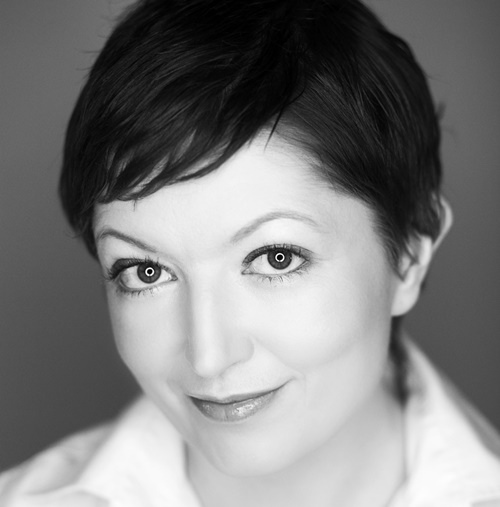
Kasia Lech
Executive Director and Director of Research and Global Initiatives at TheTheatreTimes.com
TALK ABOUT IT
Join one of our VC rooms for casual talk or post-show Q&A
PS + 11: EXTENDED
The International Online Theatre Festival
May 16 – May 31, 2020
Carmen
On June 4, 2016, The National YoungArts Foundation presented Outside the Box: Jay Scheib’s “Carmen. ” Staged as a work-in-process-process-in-work on a new adaptation of “Carmen”, based on Bizet’s opera, a faint homage to the adaptations of Godard and Preminger, and the fantasy of Hemingway, this is “Carmen” reimagined anew. Jealousy and poverty and love-at-first-sight madness dominate this environmental live cinema opera conceived for amplified voices, piano, and two roving cameras. Mixed live to the side of a building in Miami, this is a high tempo “Carmen” marked by dynamic performances, daring melodrama and an edgy sense of what can happen when a radical new take on a classic text animates a lived urban environment.
Sopro
What happens when you place center stage a figure habitually hidden away in a corner of the theatre? The result is “Sopro,” the tale of Cristina Vidal, one of the last professional prompters still working in Portugal. Her life as a prompter for over 40 years is interwoven with plays on the stages she has served, her role as the prompter in a new production, and the adventures in love and theatre of her former director. Chekhov and Molière converse through Cristina’s life story in this remarkable homage to a particular understanding of theatre—theatre as a key part of European cultural heritage, a way of thinking through who we are and how we understand our past, theatre as a way of understanding what it means to be human. “Sopro” is a remarkable piece of political theatre—timely, urgent, and important. And it offers us a brave, elegant and highly original way of thinking through the theatre’s way of thinking about itself and the world. ONE DAY ONLY! MAY 27!
Hello Hi There
“Hello Hi There” uses the famous 1970s television debate between the philosopher Michel Foucault and linguist/activist Noam Chomsky as inspiration and material for a dialogue between two custom-designed chatbots: every evening, these computer programs, designed to mimic human conversations, perform a new – as it were, improvised – live text. Annie Dorsen’s remarkable piece asks profound questions about what constitutes performance. Human interaction is given a new dimension in “Hello Hi There” as Dorsen thrillingly explores Foucault comment that debating with Chomsky was “like talking to someone from a different species.” ONE DAY ONLY! MAY 20!
Julia
From acclaimed Brazilian interdisciplinary writer, Christiane Jatahy comes “Julia,” a highly original take on Strindberg’s 1889 play. The actors here are both making a film and at the same time acting as the characters of fiction. Jatahy, working with Marcelo Lipiani on decor, crafts a design of split movie screens, which move during the action, revealing parts of a bedroom and a kitchen—sets for live footage. The projectors follow the movement of the screens, creating a film in motion. “Julia” marks a bold and beautiful collision between reality, theatre, and film. ONE DAY ONLY! MAY 25!
Programme 2
“Programme 2” of The Centre for the Less Good Idea’s online offering introduces audiences to the hybrid analogue and digital technologies of the Pepper’s Ghost, playing with illusion through live performance and projected recordings. A mystery creature from the mind of Franz Kafka, an avant-garde verse drama by a Soviet playwright, and experimental takes on the Shakespearean soliloquy all occupy the world of the Pepper’s Ghost. Designed by co-curators Phala Ookeditse Phala and William Kentridge, this is physical theatre, performance poetry, short-form fiction, musical improvisation, and pre-recorded installation coming together in an exploration of theatrical performance as a mode of critical enquiry and a form of artistic experimentation.
Xuárez
First staged in 2015, “Xuárez,” written by Luis Barrales and directed by Manuela Infante, is set in 1541, a few months after the founding of Santiago – now Chile’s capital city. “Xuárez” revisits the nation’s colonial past through the tale of Inés de Suárez – here removed from the romantic prism in which she is all too often presented. Suárez, a Spanish conquistadora, played a key role in halting Mapuche advancement on Santiago when Michimalonco, a Mapuche leader, sent troops in to rescue a group of cacique (native chief) prisoners held by the Spanish. A way of understanding some of the faultlines and dynamics that underpin contemporary Chile, “Xuárez” is a complex, richly rewarding piece that revisits a problematic past in ways that illustrate the complex intersections of race, gender, and class in nation-building. Myth, history, and fiction intersect in intricate ways in an acclaimed work – winner of the 2015 best play and best director awards of the Chilean Critics Circle— beautifully performed by Claudia Celedón and Patricia Rivadeneira.
Cast: Claudia Celedón and Patricia Rivadeneira/ Original idea and playwriting: Luis Barrales and Manuela Infante / Playwright: Luis Barrales / Director: Manuela Infante / Stage Design, Lighting and Costumes: Yolín / Music: Atom TM / Composition for the chorus: Daniel Marabolí / Caciques: Flavio Banks, Sebastián Caro, Lucas Gnecco, Gabriel Recabarren, Lucas Salazar Stage/ DesignConstruction: Iteazul, Taller El Litre and Armería Lobos / Graphic Design: Javier Pañella / Executive Production: Patricia Rivadeneira / General Production and Press: Francisca Babul. / This project was financed by Fondart – Contest 2015 Seals from: GAM, the National Council for Culture and the Arts, Chilean Government, Professional Institute ARCOS, Oxiluz Lightning and Perrera Arte. Xuárez is presented in association with Escenix.
ONE WEEK ONLY! MAY 23 – MAY 31
Unknown, I Live With You
“Unknown, I Live With You” presents parallel stories of journeys realized through creative writing in a compromised political climate. This mixed-media installation, directed by Krystian Lada, is based on verse poems by Afghan female writers, Roya, Meena Z., Fattemah AH and Freshta. Created during clandestine creative writing workshops organized by the Afghan Women’s Writing Project (under the regime of the Taliban), these poets created raw, immediate verse as a means of narrating stories that couldn’t be openly told. In “Unknown,” these inspiring and deeply personal verse-poems are spoken and sung – to music by Katarzyna Głowicka – by opera singers, including international star Małgorzata Walewska and transgender singer Lucia Lucas. “Unknown” is an invigorating and deeply personal new piece of music theatre that shows how creativity functions as a mode towards empowerment.
Magnificat
In “Magnificat,” Marta Górnicka – internationally awarded for her contemporary approach to the classical chorus choir – together with her Chorus of Women explores and confronts socio-cultural images of femininity. The Catholic Church and the Virgin Mary serve as a central axis for an exploration of how femininity has been constructed across different Western traditions. Górnicka arranges texts from Euripides, Adam Mickiewicz, Elfriede Jelinek, the Bible, liturgy, newspaper clippings, sacred music, and pop culture into a rhythmic polyphony of words, sounds, and movements. Performed by 25 women from diverse social groups, “Magnificat” interrogates the power that the Catholic Church claims over the bodies and fates of women and stages of their protest. “Magnificat” won multiple awards at international festivals and was chosen by the Teatr magazine as Poland’s best alternative production of the 2010/11 season.
PLAYING UNTIL MAY 25th 5 PM NY/ 10 PM London / 11 PM Berlin
A Doll’s House, Part 3
“A Doll’s House, Part 3” picks up where Nora left off, after slamming the door on her husband and children in 1879. Michael+Patrick’s sequel to the sequel they never read is a self-serious examination of theater, gender, race, class, and hierarchy for the reality TV generation. Michael, Patrick, and Anna Crivelli play Nora’s three children–Bob, Ivar, and Emmie–as they attempt to create an experimental performance collective in resistance to the American New Play Development Complex. They commit themselves to new forms of media performance like ASMR and YouTube makeup tutorials. The trio of siblings works through issues of gender inequity, the hierarchies of creating performance, and inherited trauma as they grow together and apart in the wake of their mother’s absence and simultaneous hyper-presence. This is Ibsen reimagined for a twenty-first century society where nothing is quite what it first appears.
Arde brillante en los bosques de la noche (Burning bright in the forest of the night)
The 100th anniversary of the Russian Revolution offers a brilliant window into an exploration of identity formation in leading Argentine dramatist-director Mariano Pensotti’s “Arde brillante en los bosques de la noche / Burning bright in the forest of the night”. Divided into three parts, this bold, innovative work examines how progressive ideas circulated between Latin-America and Europe and how they shaped different generations in both continents. Part 1 has puppets (replicas of the actors who manipulate them) enacting the tale of a University lecturer, Estela, who finds the disparity between the ideas that shape her teaching and the realities of her domestic situation difficult to deal with. Part 2 enacts a play that Estela and her family and friends go to see about a European revolutionary struggling to adapt to life back home in Germany following time spent in Colombia. ONE WEEK ONLY! MAY 21 – MAY 30.
Peh Quo Deux
“Peh Quo Deux” brings together five of the most important Brazilian contemporary dance artists around a series of themes proposed by the Italian author Italo Calvino in his book 1988 book “Six Memos for the Next Millennium”. Director Miguel Vellinho invited the choreographers Bruno Cezario, Cristina Moura, Marcia Rubin, Paula Nestorov and Regina Miranda to create pas de deux for puppets. The result is a show that joins animated theater with contemporary dance in a project that proposes a cross-over between languages of expression. Divided into different parts, the performance brings the audience a series of choreographies executed by the puppets with movements that go beyond the abilities of human motion. The precise technical movement of the puppeteers also reveals another layer of this pas-de-deux between dance and animated theatre, inspired by literature—an exquisite choreography of lightness, quickness, exactitude, visibility and multiplicity for contemporary times.
The French
“The French” is Krzysztof Warlikowski’s latest theatrical expedition in search of the roots of present-day Europe’s mentality and identity. Its starting point is Marcel Proust’s monumental novel, “In Search of Lost Time,” which depicts a society in upheaval, shaken by the erosion of the old hierarchy, rampant antisemitism, and, above all, by the outbreak of the Great War. Channeling Gilles Deleuze’s remark that “the only dead who return are those whom one has buried too quickly and too deeply,” Warlikowski invokes Proust to reflect on the condition of today’s Europe, ironically encapsulated by the French people a century ago—explaining the play’s thought-provoking title. TWO DAYS ONLY! 23 May 2 pm EST (NY) until 25 May 2020 2 am EST (NY)
This Is The Real Thing
“This is The Real Thing,” directed by Anna Nowicka, is a production that places the body at its very center. A single dancer creates and deconstructs her environment, playing in the landscape of visual meanings and possible references. Her own body flickers and transforms, remaining in the process of continuous becoming. Various qualities, textures, fragments of emotions, associations, situations, intentions, characters, actions, become embodied, but none of them is fixed in the form of a visual object. The physical body functions rather as an infinite hypertext, referring the viewer to more and more new associations. The dialogue between the real body and its visual representations raises the question of what the body actually is, how we perceive it, and to what extent we can consciously construct it. THREE DAYS ONLY! May 21, 9 am EST (NYC) until May 24, 6 pm EST (NYC)
Forefathers’ Eve
Lithuanian theatre master Eimuntas Nekrošius directs Polish sacred Romantic drama Dziady (Forefathers’ Eve) by Polish-Lithuanian Adam Mickiewicz. The poetic drama is considered one of the greatest works of both Polish and European Romanticism, a supreme realization of Romantic ideas with imaginative metaphors and Polish folk customs, primeval rituals, spirituality, power of rite, sense of community, the tragedy of individual, and the national and existential aspects. Famous for his unique theatrical language, Nekrošius challenges the existing tradition of Dziady in Polish theatre. His highly acclaimed and multi-awarded production interrogates Polish martyrology, national myths, and obsessive belief in self-importance. The production was part of the 250th Jubilee Season of the Polish National Theatre. Surtitles are based on Charles S. Kraszewski’s translation (published by Glagoslav Publications, UK, 2016) ONE DAY ONLY! From May 27th 1 pm EST (NYC) / 7 pm CET (Warsaw) until May 28th 6 pm EST (NYC) / 00.00 am CET (Warsaw).
Opheliamachine
City Garage presented the world premiere of “Opheliamachine” in 2013, a female response to Heiner Muller’s famous “Hamletmachine.” This bold new text conveys the complexity of a century of women’s experiences in a series of kaleidoscopic episodes. A fierce, modern-day Ophelia is trapped inside the machinery that has created her consciousness, fighting to be heard. Hamlet, overwhelmed by the ceaseless flood of media, watches TV mindlessly, flipping channels with his remote control, consuming a mishmash of human beauty and horror, a daily soup of innocence and violence. This smart, ruthlessly funny play, tracks Ophelia’s impossible journey to bridge that vast space. It is a postmodern tale of love, sex, and politics in the fragmented world of our confused emotions and our modern, global, virtual sexuality. ONE WEEKEND ONLY! May 28, 8 pm EST (NYC) to May 31, 12 am EST (NYC)
Max Black
Based on texts by Paul Valery, Georg Christoph Lichtenberg, and Ludwig Wittgenstein this legendary work by Heiner Goebbels offers a feast for the eyes and ears. Music theatre pyrotechnics offer a new mode of embodying philosophical discourse in a staging that that is both sensuous and spontaneous. Here one of Europe’s most adventurous theatre-makers offers an opportunity to experience the magic that scientist Max Black is capable of realizing in his onstage laboratory where anything and everything is possible. ONE DAY ONLY!
May, 10, 6.30 pm CET for 24 hours. EXTENDED! May 29, 2:30 pm EST (NYC), 6.30 pm CET (Berlin) for 24 hours
MAIN PROGRAMME
The International Online Theatre Festival
April 15 – May 15, 2020
Rückkehr nach Reims (Returning to Reims)
First published in 2009, Didier Eribon’s memoir Returning to Reims follows the French sociologist’s return from cosmopolitan Paris to his small hometown in the wake of his father’s death and after decades away. Having grown up gay in a working-class family with a homophobic father as patriarch, Eribon employs his own complicated journey ‘home’ as a path through which to address questions of political fragmentation and the rise of the ultra-right in contemporary France. Thomas Ostemeier’s acclaimed adaptation – or reimagining, as some have termed it – is a sensual rumination on grief, sexuality, and our ever-evolving relationship with the past. ONE DAY ONLY! This production plays on 16 April 2020. Available from 6.30pm CET until midnight.
Die Ehe der Maria Braun (The Marriage of Maria Braun)
One of R.W. Fassbinder’s most extraordinary films is here reenvisaged for the stage with a canny sense of history. Maria Braun is widowed soon after marriage when her husband, Herman, returns to the battlefront. Working in a bar to make a living, she begins a relationship with a black GI. Only one night, Herman Braun returns and Maria takes a course of action that will reshape her life forever. Here Ostermeier offers a telling portrait of modern Germany – the World War II years giving way to an economic boom that reshapes the world of its protagonist. Thrillingly performed this is a tight, taut staging realized with an impeccable sense of the possible and the probable. ONE DAY ONLY! This production plays on 23 April 2020. Available from 6.30pm CET until midnight.
Ein Volksfeind (An Enemy of the People)
Dr. Stockmann discovers that the source of drinking and spa water is riddled with pathogenic micro-organisms, caused by industrial effluence. Stockmann wants to publish the findings in the newspaper and demands that the city council re-route the water pipes. Influential citizens and local journalists promise their support. However, his brother Peter, the mayor, raises some serious concerns: the economic prosperity of the spa town will be threatened. Nevertheless, Stockmann insists on transparency: for him, the affair has long since ceased to be about the polluted health spa, his target is society as a whole. Ibsen’s drama wavers on a fine line between honesty and fanaticism. What is the potential for transparency in a commercialized society? One of Ibsen’s most resonant works is made highly topical in Ostermeier’s acclaimed production. ONE DAY ONLY! This production plays on 18 April 2020. Available from 6.30pm CET until midnight.
Orlando
A heroine who is born a hero; or a hero who becomes a heroine – does it even matter? Orlando experiences four centuries of British and European human history — from the Court of Elizabeth I to the buttoned-up Victorian era. This is a life lived to the full that questions the absolutes of societal norms and conventions. Virginia Woolf’s playful interweaving of life, art, reality, and fiction delivers a visionary work with a dazzling protagonist whose multiple identities leapfrog any narrow definition or rigid categorization. In a production combining performance on stage with live video, Katie Mitchell and Alice Birch brilliantly explore Orlando’s queer journey through centuries of patriarchal history with verve and imagination. ONE DAY ONLY! This production plays on 22 April 2020. Available from 6.30pm CET until midnight.
Lenin
In 1917 Russia is shaken by the October Revolution. Just a few years later, socialism has been implemented. Lenin, the ringleader of the revolution, is in a dacha near Moscow battling physical and mental decay. Surrounded by a depleted inner circle, cut off from the Central Committee, he fights to retain his political influence. His companion Trotsky, cultural politician Lunacharsky and others who visit Lenin’s dacha conjure up recollections of the brief moment in history when everything seemed possible. But scheming to become his successor, his opponent Stalin is already waiting in the wings. Milo Rau and the Schaubühne Ensemble provide a unique examination of a society caught between awakening and apathy, revolutionary longing and reactionary opposition – a labyrinth of hope and fear, of political ideals and the collective experience of violence. ONE DAY ONLY! This production plays on 25 April 2020. Available from 6.30pm CET until midnight.
Octavia. Trepanation
Featuring a libretto based on a 1924 essay by Leon Trotsky about Lenin and fragments of a play, Octavia, attributed to Seneca about the Roman emperor Nero, this is a thrilling new opera staged with verve and ambition by one of Russia’s most acclaimed directors. An opera about the possible and the probable, about the recent and not so recent past, about tyranny and its discontents that allow Lenin, Trotsky, and Nero to enter into a poetic, interdisciplinary dialogue on what power means and how it is executed. ONE DAY ONLY! From 3 May 2020 at 6.30pm CET for 24 hours.
Idiotology
In this ambitious directorial debut, Klim Kozinsky combines fragments from Dostoevky’s The Idiot with the philosophical concepts explored in Leibniz’ Monadology – hence the title’s amalgam. Characters move on a nearly empty stage, and in doing so their bodies eventually come together to reveal iconic paintings. Equal parts ethereal and unnerving, this provocative production explores the power of language in shaping the human condition. ONE DAY ONLY! From 5 May 2020 at 6.30pm CET for 24 hours.
The Constant Principle
This two-part production, based on Pedro Calderón’s philosophical drama The Constant Prince and Alexander Pushkin’s A Feast in a Time of Plague, unites in a non-linear way the story of Prince Fernando, a Christian who withstands torture while in captivity — a requiem for 20th-century history and culture — and a kind of anthology-concert of the forms of modern theatre. Pushkin’s text puts everything on a vertical plane, bringing completion to the theatrical statement. A unique and unsettling production. TWO DAYS ONLY! Part 1 of this production plays from 6 May 2020 at 6.30pm CET for 24 hours. Part 2 of this production plays from 7 May 2020 at 6.30pm CET for 24 hours.
Psychosis
Directed by Alexander Zeldovic with art group AES+F, Psychosis offers a unique take on Sarah Kane’s iconic play 4.48 Psychosis. Written as a monologue that captures the borderline psychological state of a patient suffering from clinical depression in a psychiatric clinic, the production reenvisages Kane’s single voice as a chorus of internal voices invoked by the nineteen actresses of the Stanislavsky Electrotheatre. This is a highly original reading of a contemporary classic realized with imagination, verve and a dynamic understanding of the moods and intonations of Kane’s distinctive language. ONE DAY ONLY! From 8 May 2020 at 6.30pm CET for 24 hours.
Max Black
Based on texts by Paul Valery, Georg Christoph Lichtenberg, and Ludwig Wittgenstein this legendary work by Heiner Goebbels offers a feast for the eyes and ears. Music theatre pyrotechnics offer a new mode of embodying philosophical discourse in a staging that that is both sensuous and spontaneous. Here one of Europe’s most adventurous theatre-makers offers an opportunity to experience the magic that scientist Max Black is capable of realizing in his onstage laboratory where anything and everything is possible. ONE DAY ONLY!
May, 10, 6.30 pm CET for 24 hours. EXTENDED! May 29, 2:30 pm EST (NYC), 6.30 pm CET (Berlin) for 24 hours
Othello
‘Look to her, Moor, if thou hast eyes to see. She has deceived her father, and may thee.’ One could argue that Brabantio’s warning to Othello is the pulse that runs through one of the most sinister of Shakespeare’s plays: if true, Richard Twyman and the English Touring Theatre have exploited this to full effect. In a taut staging addressing contemporary religious tensions – particularly those between Islam and Christianity – Victor Oshin masterfully humanizes the protagonist before his inevitable fall whilst Kitty Archer as Desdemona provides a tragic foil to his demise. A thrillingly tense an immensely humane exploration of the danger of jealousy unleashed.
Negative Space
“Theatrical space as a place of possibilities and (im) possibilities is revealed in the work of leading UK-Belgian company Reckless Sleepers. In the absence of a conventional narrative, meaning, movement and logic become liquid and changing concepts in a hypnotic and intriguing composition that reinvents itself with each viewing. In a world where you can be anything… can you only be what is expected of you? Can we break down the pre-established limits of the theatrical (and real) worlds on stage and agree on the fact that we might have seen the same piece… but not really?
”
(A)pollonia
Krzysztof Warlikowski’s (A)pollonia is based on classical and contemporary texts, primarily, excerpts from Euripides’ Alcestis, the Oresteia by Aeschylus, and Hanna Krall’s Pola. The erudite script also includes fragments of Jonathan Littell’s Les Bienveillantes, J.M Coetzee’s Elizabeth Costello, Rabidranath Tagore’s drama The Post Office, and more. By bringing together these texts, Warlikowski seeks to shed light on the ambiguous and somber history of sacrifice, and self-sacrifice – giving up one’s life for another – in particular. Stories of mythological characters ruled by Fate are complemented and reflected in twentieth-century experience with its helplessness in the face of the Holocaust. In the act of sacrifice, the executioner becomes no less important than the victim.
Anty-Gone Tryptich Part II
To tell the mythical story of Antigone, Song of the Goat uses a hypnotic mix of narration, polyphonic singing, choreography and the music of a cello. The performers’ contemporary dance movements, combined in different ways throughout the show, invite us to reflect on the figure of Antigone: are all the people we see a part of that mythical figure? Perhaps those movements, to the beat of a multiplicity of polyphonic voices, could be the embodiment of the doubts that torment Antigone? In a world where you can be anything… Can you be loyal to your beliefs while thunderous voices sow doubts around you?
The Clock God from the West
The theatrical stage is always a magic place where time, space and culture intersects. On stage, magic can send you back to the past, but how can it remove your pride, greed, envy and lust? In a dark age, no one is optimistic about the future, the only way that they can find relief is by looking back. Can the family in the East finally find any resolution with the magic of the clock from the West? The play was produced by Quirky Moth Theatre, one of China’s leading theatre companies established by a group of younger-generation practitioners and here they explore the influence of the West on China’s sense of self with a heightened sense of the intersections between past, present and future.
Department of Dreams
In this nightmarish, Orwellian comedy, an autocratic government demands its citizens deposit their dreams in a central bureaucratic depository so that it can exert the fullest possible control of their imaginations. Dan, a new hire for the prized job of Interpreter, sifts patiently through the nation’s dreams looking for threats to the government’s authority. but finds nothing is as it seems except the authority he serves. A key work from Kosovan playwright Jeton Naziraj is given a memorable production, first staged at LA’s City Garage in 2019.
The Rosenbergs
The North-American premiere of Joachim Holbek’s and Rhea Leman’s 2015 opera, The Rosenbergs presents a new lens for looking at the relationship of Ethel and Julius Rosenberg, the US citizens convicted of spying for the Soviet Union. Drawing on their letters from prison in 1953, this moving exploration of the Rosenbergs’ personal and political commitment is intensely realised, with Christie Lee Gibson and Brian Church excelling as the doomed couple trying to navigate a difficult line between idealism and naivety. What would you be prepared to do for what you believe in? This is a production that allows The Rosenbergs a new trial, inviting the audience to come to its own conclusions about what moral responsibility means and how to exercise it.
Blue Bird
The Blue Bird is a trilogy based, in part, on the play by Belgian symbolist Maurice Maeterlinck. Boris Yukhananov staged it as a journey into a fantastic, eccentrically structured world where experiments with the spectator’s imagination alternate with deep reflections on culture, time and theatre. The personal memories of veteran actors Vladimir Korenev and Aleftina Konstantinova – he in the role of the boy Tyltyl and she in the role of the girl Mytyl – emerge as vivid, documentary commentary on this mystical story about the search for Happiness. Each of the production’s parts has its own name – Journey, Night, and Bliss – its own structure, and artistic fabric. Each is stylistically diverse and absorbs the experience of world theatre culture in its own way.
Family Album
Is it surprising to see conflicts and compromises as three generations of a family – a grandmother, her children and grandchildren — all coexist in the same house? Described as a ‘tragi-comedy about dumplings and the 90s’, Spiazzi’s perceptive piece has the actors performing in masks. Each generation is distinguished by their own characteristics and quibbles. What this live family album looks like depends on our own interpretations, and it can be like anything…
2007: Macbeth
The Shakespeare’s play, directed by Grzegorz Jarzyna, is set on an American military base in present-day Iraq. Macbeth commands a daring military operation during daily Muslim prayers that ends with him terminating the local rebel leaders. The act, while praised by General Duncan, in just the first in a series of brutal murders that the ambitious military man will commit, incited by his ruthless wife and his evergrowing aspirations.
The televised version of the play was produced in 2006, just a month before the demolition of the Warsaw Waryński Factory complex, which had served as the stage for 2007: Macbeth ever since the play’s premiere. Dynamic close-ups, editing, and additional sound effects improved and focused the intimacy and dynamics of multiple shots, while the pervasively claustrophobic interiors where the increasingly psychotic Macbeth spends his days strongly emphasized the liminal psychological condition of the protagonist.
Pythonland
A theatrical exercise holds the potential of becoming an event in which the onstage action is related to the cultures of what is happening offstage. Performed at a 400-year-old theatre in China, this adaptation of the thousand-year-old ancient Chinese myth of ‘Genesis’ is given its new life in a contemporary setting. Sitting in the theatre and thinking about how the world has been created, the audience is given the chance to reflect its sense of time and space by seeing how modern and traditional Chinese performing cultures can be interwoven. Engage in cyberspace and let us know what you think of this theatrical encounter.
Home Makers
Combining elements of performance, storytelling and applied theatre, these soundwalks invite us to visit different places or just to close our eyes and let ourselves be guided by the voices of the migrant domestic and care workers, who encourage us to reflect on the power of a voice and a story coming from the heart. Home Makers leads us to rethink our definition of theatrical space and, perhaps, the limits of performance and the paradox of presence in absence. The voices in Home Makers seem to ask us: In a world where you can be anything, can you be aware of unheard stories and acknowledge the steps of those who stood in this place before you?
No Matter How Hard We Tried (Między Nami Dobrze Jest)
No Matter How Hard We Tried was directed by Grzegorz Jarzyna based on the play by Dorota Masłowska, commissioned by TR Warszawa and Berlin’s Schopenhauer am Lehniner Platz. The piece is a masterful exposition of the language of advertisements, glossy magazines, and tabloids; it confronts consumptionist dreams with the reality of a family living below the poverty line. All of this is merely a shell beneath which a more serious question lies: a question about the “us” in the title, about national identity, tradition, and memory.
Hamletmachine
For Hamletmachine, Wilson first worked with students at New York University, and later–in the original German version–with theater students in Hamburg, produced by the Thalia Theater. In 2017, the production was revived in an Italian version with acting students from the Theater Academy “Silvio d’Amico” in Rome. Heiner Müller himself called Wilson’s production “the best production ever” of this work, praising it for its lightness and absence of interpretive staging. ONE DAY ONLY! May 1st, for 24 hours.
BEYOND THE STAGE
April 15 – May 15, 2020
El Virus De La Por (Virus of Fear)
Unlike Masks and The Rest I Make Up, Ventura Pons’ Virus of Fear (2015) is not a documentary. It is, however, decidedly theatrical: based on the acclaimed play by Josep Maria Miró, Arquimedes’ Principle, the film follows a community grappling with the aftermath of an alleged sexual assault at a local swimming pool. Unwilling to take sides or to pontificate, Pons offers instead a challenging, bold examination of the contagious nature of terror and collective anxiety.
The Rest I Make Up
Michelle Memran’s The Rest I Make Up (2018) is a moving documentary about Cuban-American playwright and director Maria Irene Fornes. A pioneer in the New York City arts scene of the latter half of the 20th century, Fornes is a whirlwind of sharp wit and seemingly endless creativity. Her eventual struggle with Alzheimer’s, portrayed delicately by Memran, does little to slow her down. This is a remarkable portrait both of an intergenerational friendship and of a creative artist whose impact on American theatre has been acknowledged by writers as different as Edward Albee and Tony Kushner. This film plays from 15-29 April.
Màscares (Masks)
In Masks (2009), Elisabet Cabeza and Esteve Riambau follow the acclaimed Spanish actor Josep Maria Pou as he prepares to play the part of Orson Welles. As spectators, we are allowed a rare glimpse into the performer’s creative process, observing how he shapes the character before, during, and following the rehearsal period.
WITH SPECIAL THANKS TO:
Ariadne Mikou, Bryce Lease, Charles Duncombe, Colleen O’Shea, Eddie Aronoff, Elisabet Cabeza Gutes, Ella Parry-Davies, Frederique Michel, Helen Monroe, Irina Tokareva, Joe Chen, John Freedman, Kate Snodgrass, Kendra Hodgson, Maja Zade, Mark Ravenhill, Marta Szotkowska, Michelle Memran, Olia Shylo, Tianjiao Liu, Tomasz Wiśniewski, Ventura Pons and Els Films de la Rambla, Women Make Movies, Yan Chen, and drobotdean from FreePik for the logo.
This post was written by The Theatre Times.
The views expressed here belong to the author and do not necessarily reflect our views and opinions.


